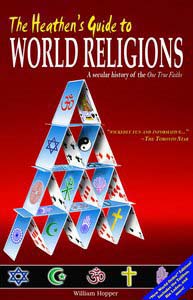 By James Zimmerman
By James ZimmermanWilliam Hopper’s The Heathen’s Guide presents a light-hearted, at times comical, overview of the world’s religions. It’s a short book, and thus doesn’t capture every detail about every little sect or cult in existence, but it spends a chapter on each of the biggies. The book is laid-out in a logical order: the chapter on Judaism leads to a chapter on Christianity leads to a chapter on Islam.
The overlapping religions of Buddhism and Hinduism are side-by-side, too. In each chapter, Hopper gives the historical roots of each religion, details the changes the religions experienced through the centuries, and offers tidbits on their current statuses. Hopper is insightful enough to know what will most interest his readers. In the chapter on Judaism, for instance, he devotes a couple of pages to the Kabbalah, and in the chapter on Islam, he explains how bin-Laden arrived at his extremist views. He also offers information on various religious offshoots – such as his subheading on Mormonism.
Unfortunately, though, the book is filled with errors. And I don’t mean spelling or punctuation errors (though there are plenty of those, too). No, I am referring to factual errors. True, Hooper is attempting to write a humorous book here, but he’s also trying to give his readers’ an accurate overview of world religions. Errors include:
-The bible claims that the Patriarch Abraham lived to be 200 years old. (No, it doesn’t.)
-God sent Jonah to Israel to warn them ‘about being bad,’ then later climbs a mystical ladder. (Jonah was sent to preach to the inhabitants of Ninevah, in Assyria. And it was Jacob, not Jonah, who climbed a ladder.)
-Alexander the Great’s territory was divided among his children when he died. (Alexander only had one young son at the time of his death; his territory was divided among his generals.
-Bilbo met up with and manipulated Gollum in The Lord of the Rings. (Actually, this occurred in The Hobbit.)
-The Jewish temple was destroyed in 607 BC. (It was destroyed some twenty years later than that date. 607 is used by various fundamentalist groups in an effort to retro-fit bible prophecies into real-world events.)
-Jehovah’s Witnesses believe in a concept called the ‘rapture.’ (No, they don’t. In fact, the majority of Witnesses do not believe they will ever go to heaven regardless of how devoutly they proselytize. Also, Hopper claims their proselytizing is based on a prophesy in Revelation, but the scripture he cites is from Matthew.)
-Dr. Radhakrishnan was President of India in the early part of this century. (Radhakrishnan served as India’s President in the 1960s. He died before this century even began.)
I cite these, not to poke fun at the book, but to question its validity in other matters: if I caught this many factual errors, how many did I not catch? I am not very well-versed in the history of Islam or in the tenets of Hinduism, but I am not confident that what I read about those religions in Hopper’s book is at all accurate. Indeed, Hopper almost seems to encourage this feeling. More than once, he admits that what he’s discussing is boring. On one page, he claims he’s too lazy to get up and do the proper research. And the book’s bibliography begins with a definition of ‘bibliography’: “A list of books intended to illustrate that the author has read enough of other people’s thoughts to think his own.”
Hopper is not afraid to lambaste religion and religious holy books at every turn. This is frequently funny, even refreshing. But here, again, Hopper often fails to use convincing arguments. For example, when providing reasons against Moses’ authorship of the Torah, Hopper cites the two weakest arguments: It’s written in second-person (Hopper even admits this is not very convincing), and Moses dies in the penultimate chapter.
The Heathen’s Guide is a decent book and, at about 200 pages (excluding the endnotes, glossary, and index), it doesn’t require a major time investment. Still, I’m hoping a more accurate look at the comedy of errors that is religion appears on the shelves soon.
To find out more about the book, visit heathensguide.com.
Bottom line: C

